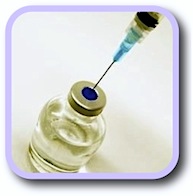Doctors’ Notes
BackDTaP Vaccine
The DTaP Vaccines protect against three different illnesses: Diphtheria, Tetanus and Pertussis.
 Diphtheria causes a thick gray covering in the back of the throat and can lead to breathing problems, paralysis, heart failure and even death. The bacteria make a toxin that kills healthy tissue in the respiratory system. The bacteria can also infect the skin, causing open sores or ulcers. Before vaccines, diphtheria was one of the leading causes of childhood death around the world. Diptheria is spread from person to person through respiratory droplets, most often produced by coughing or sneezing.
Diphtheria causes a thick gray covering in the back of the throat and can lead to breathing problems, paralysis, heart failure and even death. The bacteria make a toxin that kills healthy tissue in the respiratory system. The bacteria can also infect the skin, causing open sores or ulcers. Before vaccines, diphtheria was one of the leading causes of childhood death around the world. Diptheria is spread from person to person through respiratory droplets, most often produced by coughing or sneezing.
Tetanus (Lockjaw) causes painful tightening of the muscles, which can lead to “locking” of the jaw so the victim is unable to open their mouth or swallow. It can also lead to broken bones from severe muscle spasms, breathing problems, pneumonias, high blood pressure, abnormal heart rhythms and blood clots in the lungs. Tetanus enters the body through cuts or wounds and is not contagious. It causes death in 2 out of every 10 cases.
Pertussis (Whooping cough) starts out as early symptoms such as runny nose, low grade fever, and a mild cough. After a few weeks, as the disease progresses it causes coughing spells that make it difficult for an infant to eat, drink, or breathe. These spells can last for weeks and lead to pneumonia, vomiting, fatigue, seizures (jerking and staring spells), brain damage, and even death. In teens and adults, it can lead to weight loss, loss of bladder control, fainting, and rib fractures from severe coughing. Before vaccines, 200,000 children got sick each year from pertussis, and on average, 9,000 died each year.
In general, DTaP vaccines are 80 to 90% effective. They are most commonly presented in the combination vaccine called Pentacel.
DTaP Vaccine Schedule
2 months
4 months
6 months
12-15 months
4-6 years
*Older individuals receive Tdap vaccine between the ages of 11 and 64 years old
*Td vaccine is recommended every 5-10 years
Potential Vaccine Reactions
• Redness and tenderness at the injection site
• Fever (>100.4 F)
• Irritability
• Fatigue
• Loss of appetite
• Seizures (in very rare cases)
Brooke Kulasa, PA-C, has been a Kids Plus Provider since 2019.